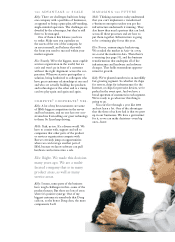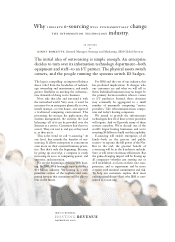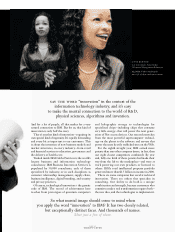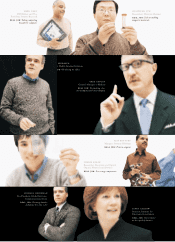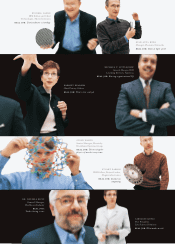IBM 2000 Annual Report Download - page 32
Download and view the complete annual report
Please find page 32 of the 2000 IBM annual report below. You can navigate through the pages in the report by either clicking on the pages listed below, or by using the keyword search tool below to find specific information within the annual report.
page no.
thirty
Linux is like the Internet itself
—
it’s unowned,
and unownable. Anyone can propose software
changes, as long as those changes are returned
to a loose-knit network of developers known
as the Open Source community. It’s a highly
selective, disciplined process that serves two
purposes: It throws technical innovation into
perpetual fast-forward; and it guarantees the
world that Linux will always remain beyond
the control of any single vendor.
In my mind, then, Linux is a phenomenon
that holds the potential to change the game
along two important dimensions.
1. It fulfills a big promise: all hardware, soft-
ware and applications working together. Linux
is a wonderful thing because it is the first
operating system to run on any hardware
platform. That means it can do for business
applications what the Internet did for net-
working and communications
—
deliver on the
promise of truly open, interoperable, any-
to-any computing.
In a world where a billion people using a
trillion devices are all interconnected, can
you imagine that software and hardware that
hasn’t even been invented yet will have to
coexist? Of course! Linux will make that pos-
sible, and that’s one reason it’s going to grow
a lot faster than any other operating system
over the next several years.
It’s interesting to me that some people are
surprised that IBM is embracing Linux, while
other large technology companies are trying
to act as though Linux weren’t happening.
This shouldn’t be a surprise. Linux is bring-
ing the game back into our zone, precisely
because we saw the world moving to open
standards and fundamentally reconfigured
our products, our strategy and our culture
toward open systems, common standards and
collaborative business practices.
2. It alters the way our industry delivers value to
its customers (which is very good news for IBM).
A lot of people who have played by one set of
rules in this industry are going to find out
they’re now playing a different game. The
widespread adoption of Linux is going to neu-
tralize any vendor’s ability to exercise control
—
over customers or software developers
—
based
on that vendor’s proprietary operating system.
When applications are no longer lashed to a
specific operating platform, control and choice
shift away from the technology company,
and into the hands of customers. This makes
possible an equally seismic shift in the way
value is delivered
—
through services, through
middleware, through servers.
So, we’re going to invest $1 billion in Linux,
and we’ve dedicated 1,500 programmers to
enable every IBM hardware and software
product for Linux. Our strategy is to accelerate
its adoption as a platform that can support
heavy-duty, enterprise workloads
—
such as
those already in production with customers
like weather.com, Shell International Explora-
tion and Production in the Netherlands, and
Telia, Scandinavia’s largest telecommunica-
tions company.
We think that, at the end of the day, the
operating system that provides the most flex-
ibility to customers is the one that is going to
end up winning. We’re voting with our cus-
tomers on this one. We’re betting a big part
of IBM’s future on Linux.
an opinion
by
irving wladawsky-berger,Vice President, Technology and Strategy, IBM Server Group
Why i believe Linux will fundamentally change
the information technology industry.
If Linux were just another operating system, we wouldn’t be all that
high on it. But that’s what’s so interesting. Linux is an operating
system, but it’s also radically different from anything that has come
before it. It changes the way software is created and delivered.







